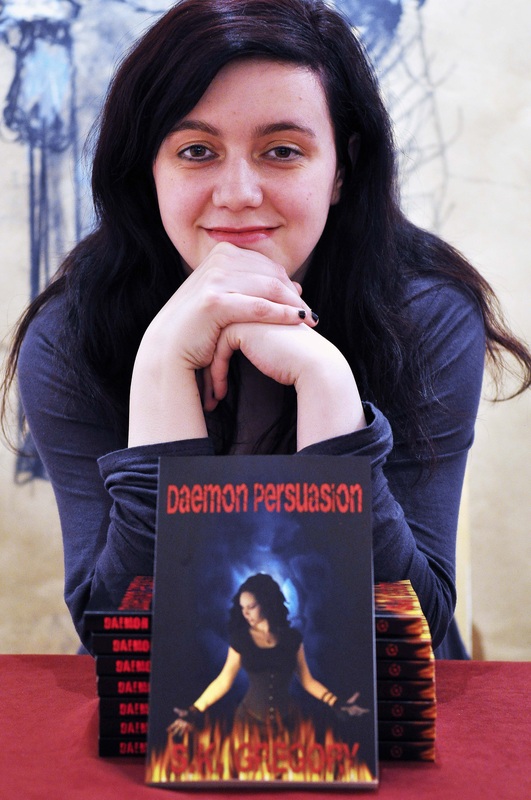|
Evermore
Gina regretted volunteering to overhaul the choir’s music files the instant she laid eyes on the job ahead of her. She had been let in via the tradesman’s entrance at the rear of the building, shown to a flight of stairs past the main hall to the cellars below. The musty smell of the old building and its dimly lit corridors were off putting enough, but on being let into the cellar, Gina’s heart really sank. A row of eight filing cabinets, all stuffed full of words and music, lined the wall to her left. Spread across the floor more boxes held music, some over-flowing, spilling their contents. Items of old furniture, broken chairs, ancient tables, clothes rails, even an old organ, were variously strewn with sheets of music and all kinds of litter that appeared long forgotten. “We’ll just be upstairs in rehearsal. It’s much appreciated,” Peter, the elderly chorister who had escorted Gina down to the cellar, shakily handed over the cellar key, nodded his thanks and turned to climb the stairs. The strains of a piano playing and muffled voices became briefly clearer as the door was pushed open and Peter joined the choir. Gina felt strangely distant down here in the cellar alone, as if the hall and its male voice choir were very far away. She fought back the irrational urge to follow Peter up the stairs and tell him she’d changed her mind, instead turning her attention to the task at hand. She would itemise the contents of the boxes first, she decided. Laying them out alphabetically across the floor, she could get them in some sort of order before she even opened a filing cabinet. She began pushing some of the furniture out of the way, scraping chair legs noisily across the red tile floor, struggling with a table far heavier than it looked. Upstairs, the choir were singing Deus Salutis. Something stirred in the far corner. Panting from exertion, Gina stood up straight and watched for further movement; nothing, merely shadows within shadows. It was much darker there she noted; the lights at that end of the room were not switched on. Expecting a cat or worse, a rat, she crossed back to the open doorway. Four light switches were set into the wall; only two of them were on. She flicked them, expecting the room to flood with light. A single dim bulb seeped into life. Opposite, in the corner where Gina thought she had seen something move, it remained stubbornly dark. Gina shivered; that corner was wholly uninviting. Perhaps it was just that it was the darkest spot in the room. Maybe her hair had fallen into her eyes and tricked her into thinking she had seen something. She shrugged it off, feeling faintly foolish and conscious of the need to make a start on the filing. Cursing the fact that she had forgotten her notepad, she began casting about for scraps of paper to write on. She had found a marker pen sitting on top of a box. Now she needed to write the letters of the alphabet on separate sheets and lay them in order across the floor; a rudimentary filing system to begin with. She had made a good start, the floor covered with small, neat piles of music sheets, her hands grubby with the feel of old, untouched papers, when Peter reappeared at the door, “All okay?” he asked, scanning the room warily, “We’ve finished for tonight. See you Wednesday will we?” “Oh, is that the time already? Yes, see you Wednesday,” Gina said, more brightly than she felt. Her gaze had been dragged back to that dark corner the whole time she was working. She glanced across at it now involuntarily, Peter’s eyes following hers. “You’ve been busy,” He nodded at the rows of paper, all headed with assorted scraps individually marked A-Z, making three rows in all. Gina was suddenly alarmed. “Do cleaners come down here?” she asked, afraid her painstaking work would be tidied away. Peter gave her an odd look, “Nobody comes down here, just me,” he paused, “and now you.” He held his hand out for the key. Glad to give it back, Gina grabbed her coat and bag and was at the top of the stairs and outside before Peter had a chance to lock the cellar door. * In the warmth and safety of her flat, Gina dismissed the whole incident as her over-active imagination. She had been on edge ever since she moved in a few weeks ago. It being near impossible to find a job hadn’t helped. That was why she had volunteered her services in the first place she reminded herself, when she had seen the choir’s rather old-fashioned advert for a ‘voluntary filing clerk’ in the local paper. It would give her something to focus on while she job hunted. Yet the memory of that dark corner stayed with her, invading her dreams and turning them into near-nightmares, where everything came in shades of black and grey and all the shapes were nebulous, sinister; formless. On Wednesday evening she decided to take a torch with her, to investigate the darkness, expose her fears as groundless and forget about it once and for all. * Peter handed her the key once again and wordlessly climbed the stairs. Immediately, Gina felt a tingling at her back. There was no one there; just that dark corner, heavy with threat, brooding and forbidding. She half expected her work to be scattered wide but it lay just as she had left it. Heartened, she decided to investigate the corner first, put it behind her and get on with the job. The torch felt hard and comfortingly real in her jacket pocket. She took it out and set it to full beam. It glowed strong and powerful. Encouraged, she picked her way carefully across the floor. She saw now that when she had been pushing furniture out of the way she had formed a line; tables, chairs, clothes rail and organ standing in a row as if to delineate light and dark, or to hold something at bay. She chided herself for the thought; it was nothing more than a subconscious action, her tidy mind taking over, that’s all. A navy blue jacket, the choir’s emblem on its left breast, hung from the clothes rail, along with some empty hangers and a tatty old suit cover. They rattled as she used the top bar as a hand hold and stepped through the body of the rail. She took a few steps, trailing the torchlight slowly over the rear wall and into the corner. The pulse in her throat quickened, her chest constricted. A cold sweat covered her back as the shadowy forms became more distinct. A single picture frame hung lopsidedly from the wall. There was no plaster or paintwork here, just the original bare brick. A scrap of carpet lay under an old wooden chair and an ancient filing cabinet stood at an angle to the wall. Other than that, there was nothing. These items were much like everything else in the room, not at all out of place; there were certainly no disembodied figures or leering spectres lurking there. Relieved, Gina nevertheless couldn’t wait to get away from there. Unwilling to turn her back, she clumsily found her way back to the clothes rail and the light beyond. She realised she was shaking, her breath coming in short, panicky rasps. She gave a weak laugh, more forced than real, and tried to calm down. Her hands were cold and trembling as she began sorting the papers on the floor, her work doing nothing to warm or steady them. At last, Peter appeared at the doorway and told her it was time to leave. She couldn’t resist looking over at the corner one last time, but now a different movement caught her eye. The navy jacket was swinging on the rail; not wildly like it had when she had knocked it in passing earlier, but regularly, uniformly; as if it was being steadily pushed by a hand on the other side. The hangers and the tatty suit cover hung still and unmoving beside it. Gina’s blood ran cold. She turned to Peter to gauge if he had seen it too, but he wasn’t even looking that way. He was simply staring at her, his hand raised to take back the key. * She made up her mind not to go back on Monday as arranged. She would phone Peter and tell him she had other commitments. He wouldn’t argue; he knew as well as she did that there was something odd in that cellar. She had seen it in his eyes. The dreams came again, more vivid than before. Now, from the grey-gloom of her nightmares the chair took on a weird life of its own, bulging and bending as if it might burst, tongues lolling from its wooden arms as if to lick her, hands growing from its frame to reach out and grasp her. The filing cabinet drawers seemed to scream as they opened, sending flakes of rust falling to the carpet below to pool, suddenly wet, like blood, at its feet; and all the time that picture frame swung madly from side to side, scraping the brickwork, the glass inside splintering into myriad spiteful pieces… * She had resolved not to go back there a hundred times or more, so Gina was surprised to find herself back that Monday evening as promised. Peter seemed even more so. He said nothing, but the way his eyebrows raised and his mouth formed a small oh at seeing her gave him away. He unlocked the door, slipped the key into her hand and climbed the stairs, never speaking a word. Gina was grateful for that, sure that normal conversation was beyond her. Moments later there came the sound of masculine voices, the piano striking up a tune she did not recognise. Gina turned to look into the cellar. Part of her had half expected the scraps of paper bearing the alphabet to have formed some message, like a giant Ouija board. She let out a sigh of relief to find that they were once again exactly as she had left them. Across the room, the jacket and its companions hung peaceably on the rail. She grasped the torch in her pocket tightly for reassurance, as if it had become some kind of talisman and stepped down into the room. * Things had been quiet; she had got a lot done. It took Gina a good while to even realise that something was amiss. She had been finding a disproportionate number of sheets for one song; Evermore. Curious as to why there were so many copies of this, she had nonetheless stacked them up and filed them into her rough system under ‘E’ accordingly, this pile now much higher and less stable than all the others. It was only when she stopped to straighten up and rub her aching back that she saw what was wrong. Evermore was on top of every single pile of paper on the floor. It faced upwards from every stack; A, Evermore, B, Evermore, C, Evermore… Not one single letter of the alphabet had been missed out; X, Evermore, Y, Evermore, Z Evermore. This time her panic was instant; there was no voice of reason arguing in her head, nothing but a primitive urge telling her to get out, now. She turned on her heel and ran for the door, tripping over the handles of her bag in her haste. Cursing, she scrambled up, grabbed the bag and lunged for the door. It slammed shut in her face. Gina stopped dead in shocked confusion. What the hell was going on here? Was that Peter? Did he think this was funny? A surge of anger flooded her veins. She hammered at the door, “Peter! Peter! This is not funny. What the hell do you think you’re doing?” Her hands, slick with cold sweat, were sliding uselessly off the handle; it was locked. Gina’s stomach lurched, “Why would you lock it? I’ve got a key, remember?” Her voice was high with fear, “You gave me a key!” She fumbled about in her pockets, weak with relief when her hands brushed the cold metal of the key, “I’ve got a key!” she shouted again, hands shaking so badly she had to use both of them to guide it into the lock. It wouldn’t turn. No matter how many times she tried it this way and that, it would not open. Frustrated, Gina banged her fists against the door, screaming for help, jolting the key out of the lock, sending it clattering to the floor. He had given her the wrong key. All this time he must have planned this, slipping her a fake key to give her some false sense of safety. Yet all the time he planned to lock her down here for some hellish reason. Gina knew she had to calm down. More than ever now she needed to be rational, to think clearly. A gentle rustling behind her made the hairs on the back of her neck stand on end. A mere whisper of noise, it somehow filled the room, filling her with a dread far greater than any she had yet known. She huddled closer into the door, wishing she could somehow melt herself through it and out the other side. The rustling went on a moment longer, then stopped; the atmosphere expectant. Dreading what she might see, she turned around. Her neatly ordered rows were still untouched; the song sheet Evermore still topped each pile, but now the header letters did indeed spell out a word. Across the centre of the middle row, in Gina’s own hand-writing, was the word STAY. Gina gave a strangled sob, her breath suddenly visible on the air, spiralling upwards as a dank chill descended. The rustling began again and Gina watched, transfixed, as the letters rearranged themselves in front of her into a new word; GINA. She moaned, low and guttural, heaving her body away from the door to search frantically for the key; if she could find it, just try it one more time in the lock… The lights went out, the darkness so complete it seemed solid. There was no sound, not even a trace of movement. Gina froze. Then the grating, dry sound of something rasping across stone came to her through the darkness; a sound that made her sick with fear. She had heard that noise before, in her dreams. She couldn’t see it, yet she knew it was the picture frame, swinging to and fro on its hook, scraping the bare bricks of the wall. She closed her eyes against the darkness, making herself as small as she could, covering her ears. The scraping grew wilder, faster, louder, followed at last by the shattering of glass as the frame flew violently free of the hook and crashed to the floor. Gina cringed, expecting shards to be thrown in her direction, unseen hands to pull at her, but the room seemed to have fallen still once more. Sobbing, she fumbled for her torch, her fingers clumsy as she hurried to turn it on. Only when she heard the small click of its switch did she reopen her eyes. Over in the corner, a single bulb flickered into life. Her legs felt at once leaden and weak. Gina crawled heavily to the wall, used it for support to struggle to her feet and looked over. The bulb shone faintly above the chair and the filing cabinet. She reached back and tested the door handle one last time, knowing it was pointless, suddenly overcome with a feeling of inevitability. It was that sense of fate that lured her on towards the corner. The bare bulb was swinging erratically, sending shadows to loom monstrously inwards upon the little scene and then veer away. Her feet crunched upon shattered glass and she looked down; the frame was snapped but whatever it had held was still in one piece against the wooden backboard. She knelt down and shone her torchlight upon the paper. A face she recognised stared up at her from a photograph alongside an article in yellowing print. The title above it read: ‘Killer Chorister” Dies.’ Gina picked it up; it was a Weekly Herald paper cutting, dated some years ago. ‘Killer Chorister’ Peter Hesquith passed away in his prison cell yesterday afternoon after a brief illness. Hesquith, 87, was once a well-known and much loved local character, who late in his choir career achieved some success when his hymn, ‘Evermore’ was published. It became something of a signature tune for the now defunct male voice choir to which he belonged. His arrest and eventual imprisonment, along with several fellow choristers, was a huge shock to the community. As a consequence the song lost popularity and is now rarely sung, largely due to the nature of its lyrics when held against the evidence of his crimes. Hesquith and fellow choir members Gregory Lacey, Raymond Chapman and Phillip Greer, were all convicted of charges including theft, fraud, abduction and murder. Hesquith, widely believed to be the ringleader, received a life sentence. It was proved that the building in which the choir practised played a role in the abductions, if not the murders, of the quartet’s many victims. As a result the choir disbanded, in part as a mark of respect to the victims and their families, but also due to the widely held feeling that the building had become tainted by its misuse. It has since fallen into disrepair and is no longer in use. Hesquith is the first of the four to pass away, being the oldest by some years. There were rumours at the time of their arrest of a pact between the men to reunite ‘on the other side’ leading some to speculate there may also have been an occult interest to their activities. One thing is certain; if we do ever find out more about the actions and thinking of these men, it will not be Hesquith who tells us now.’ Gina threw the paper aside and fell onto all fours, retching. How could Peter be the man in the photograph? How could the choir be defunct? They were the very reason she was here. She had heard them herself, singing above her head as she worked in the cellar below… The chair creaked as if a sudden weight rested in it. Disbelieving, Gina wiped her mouth and looked up. Peter sat smartly upright in the chair; his eyes closed, a faint smile on his face, his feet tapping in time to a tune she could not hear. The sound of the piano came, loud and clear. Feet shuffled on the floorboards above their heads, a throat was cleared in readiness to sing. Gina could hear them; she could hear them! She curled into a ball on the floor, mindless of the shattered glass pricking her skin, sobbing freely, helplessly. Peter’s eyes flickered open. He did not even cast a glance at Gina, prostrate and defenceless at his feet. In harmony with the unseen choir, he began to sing; ‘Evermore! Evermore! We shall be together Nevermore! Nevermore! Shall we be apart Endlessly! Endlessly! We will endeavour Eternally! Eternally! Joined heart to heart…’ The song came to an end. The light went out. S. P. Oldham Comments are closed.
|
Monthly Newsletter
Categories
About the Author:S. K. Gregory is an author, editor and blogger. She currently resides in Northern Ireland. “Description begins in the writer’s imagination, but should finish in the reader’s.” Archives
July 2024
Categories |
||||||||||||||||||||||||||||||||||||||||||||||||||||||
© 2024 S.K. Gregory
Proudly powered by Weebly






 RSS Feed
RSS Feed

